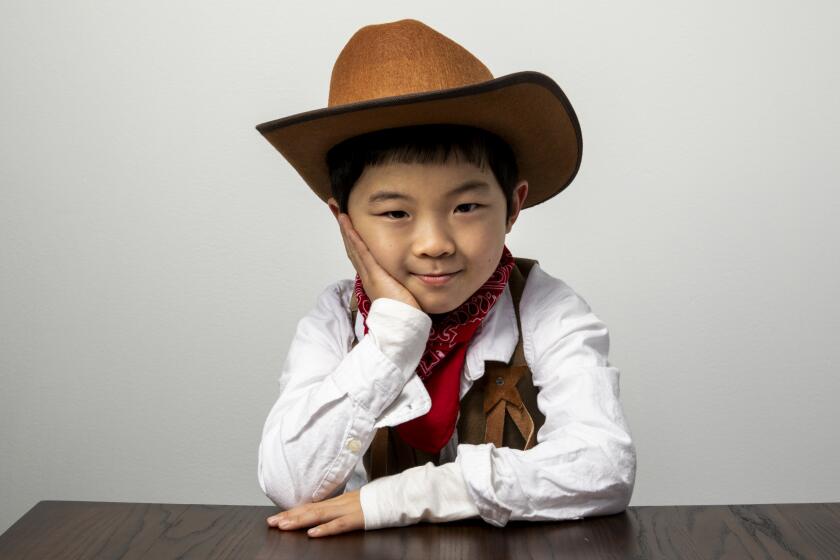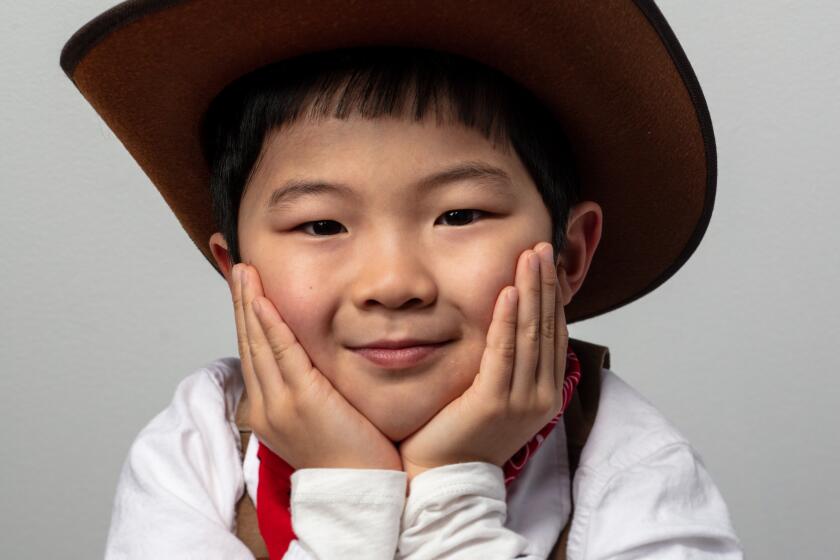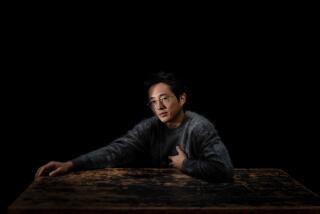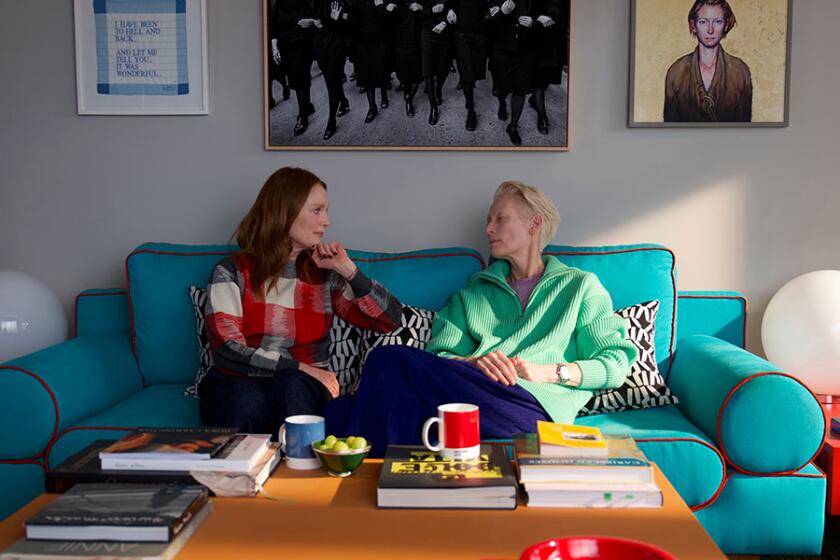- Share via
Here are some things Alan Kim likes:
Harry Potter. The song “Blinding Lights” by the Weeknd. Legos. Vanilla ice cream with chocolate syrup and rainbow sprinkles.
Acting? Yeah, he likes it. But he’s just as into playing video games or watching TV and going outside with his dog, an American Eskimo named Cream.
Alan is 8, so you can forgive him for not knowing if this whole Hollywood thing is for him yet. At the moment, however, he’s getting a lot of attention because he is one of the stars of the new movie “Minari,” an award-winning drama about a family of South Korean immigrants trying to build a life for themselves on a farm in rural Arkansas in the 1980s. The movie, out Friday in theaters and on a special digital platform from distributor A24, features actors who are far more recognizable than Alan: The family’s patriarch is played by “The Walking Dead’s” Steven Yeun, and Yuh-Jung Youn — who is kind of like Korea’s Meryl Streep — costars as the grandmother.
But it is Alan, whose face was previously seen in print advertisements for Pottery Barn Kids, who has emerged as “Minari’s” breakout star. When the movie debuted at the Sundance Film Festival in early 2020, he turned up at every screening or interview dressed like a cowboy: Western hat, bandanna, boots and a sheriff’s badge pinned on his suede vest.
“It was kind of like getting an early Halloween, except no candy and no decorations,” Alan said. “I had the cowboy boots from the movie, and my mom was like, ‘Come on, wear this!’”

8-year-old Alan Kim stars in “Minari,” which chronicles a Korean American family’s move to Arkansas in the 1980s. He sat down with the L.A. Times to talk about what it was like to be in his first movie.
In his promotional appearances for “Minari,” Alan has continued to show off his panache even over Zoom, rotating through a collection of dapper miniature blazers and starched shirts. For this interview from his family’s home in Irvine, he is wearing a pastel bow tie and collared shirt embroidered with seagulls and boats. While he may not be used to speaking about himself yet — his speech is peppered with one-word answers and “I don’t know’s” — he is comfortable on video chat. He’s in the third grade but has been doing virtual school since the pandemic began in March 2020.
“I actually like it, because I can finally relax,” he said, giggling. His favorite subjects are math and technology, though he is still learning about the latter. On Instagram, he has “like, maybe 2,000 followers?” — he had 2,768 at press time — but his parents run his account because “I don’t think I’m responsible enough with it.”
At Sundance in 2020, The Times invited young “Minari” star Alan Kim into its photo studio. Now he’s in the Golden Globes and Oscars races.
Perhaps it was the adoration he was greeted with in Park City last year, but Alan seemed to have an idea that those numbers might be going up soon. Asked if he expects he’ll be famous post-”Minari,” he answered enthusiastically and without haste: “Yes.”
And how will his life change?
“I will have to stay inside all the time,” he said. Or, if outside: “I would have to wear a hoodie and full disguise!”
In “Minari,” Alan plays David, a boy whose desire to run free through the Arkansas wilderness surrounding his family’s new trailer is restrained due to a heart murmur. He is forced to share his bedroom with his grandmother, newly arrived from Korea, who makes him try traditional herbal remedies he thinks taste revolting. Director Lee Isaac Chung needed a boy for the part who could pull off being both adorable and a hellion — “a kid who pees in his grandma’s tea and still somehow doesn’t come across terribly,” he said.
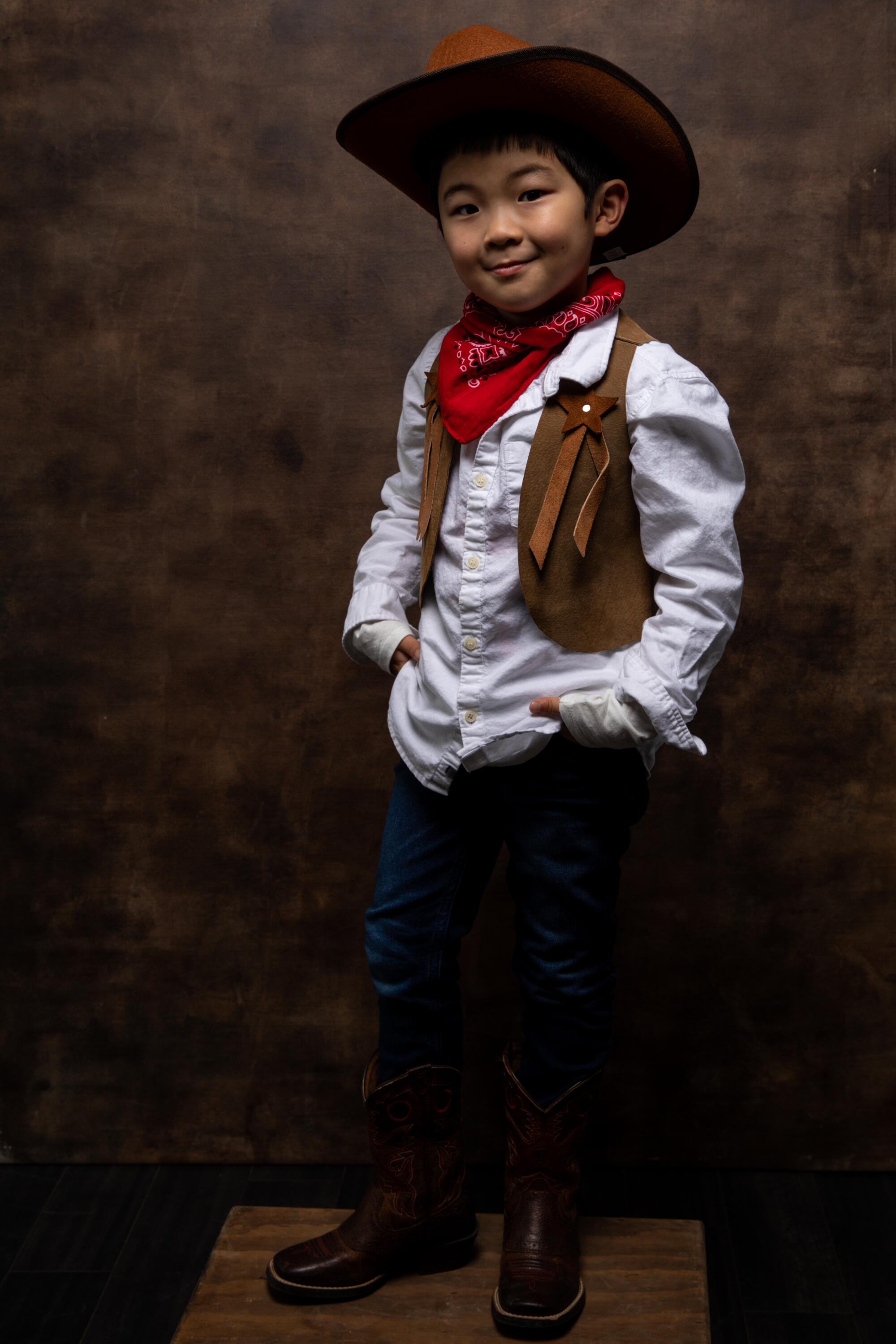
So with just six weeks, casting director Julia Kim set out to find the perfect kid. She needed a child who was fluent in both English and Korean, and, of course, one who physically resembled the actors who’d already been hired to play his parents (Steven Yeun and Yeri Han).
“As you can imagine, that’s not a long database,” said Kim. Knowing she’d be unable to rely solely on young actors with talent representation, she drew upon her connections within L.A.’s Korean American community. In Koreatown, Kim visited churches and after-school programs, asking administrators for permission to quietly observe from a distance.
“I’d let them know it was a quality film and a real opportunity for a child to shine, so you’d think every parent would jump at it — but I got a lot of reluctance,” Kim recalled. “It’s a real commitment, and they weren’t sure what they were getting into. So a lot of ‘no thank you’s’ came my way.”
‘Minari’ actress Yuh-Jung Youn on the critically acclaimed family drama from Lee Isaac Chung and her legendary acting career.
To broaden the scope of her search, Kim decided to visit the office of a local Korean newspaper. The next day, the daily publication ran a notice about the “Minari” casting call that included a photograph of Youn, a 73-year-old actress who is revered in South Korea.
A couple of weeks later, emails started trickling in — one from Alan’s representative at a boutique agency. He’d never acted before, something his audition tape made obvious. In it, Alan’s actions were exaggerated; when he pretended to take a bad-tasting medicine, he scowled and yelled in an over-the-top fashion.
“But I still kept watching his tape because I found him so funny,” recalled Chung, the director. “I was kind of worried about whether or not he could take direction, and needed to see if he could do things in a more natural way instead of a stage way. And he does. There’s such an honesty to what he’s doing.”
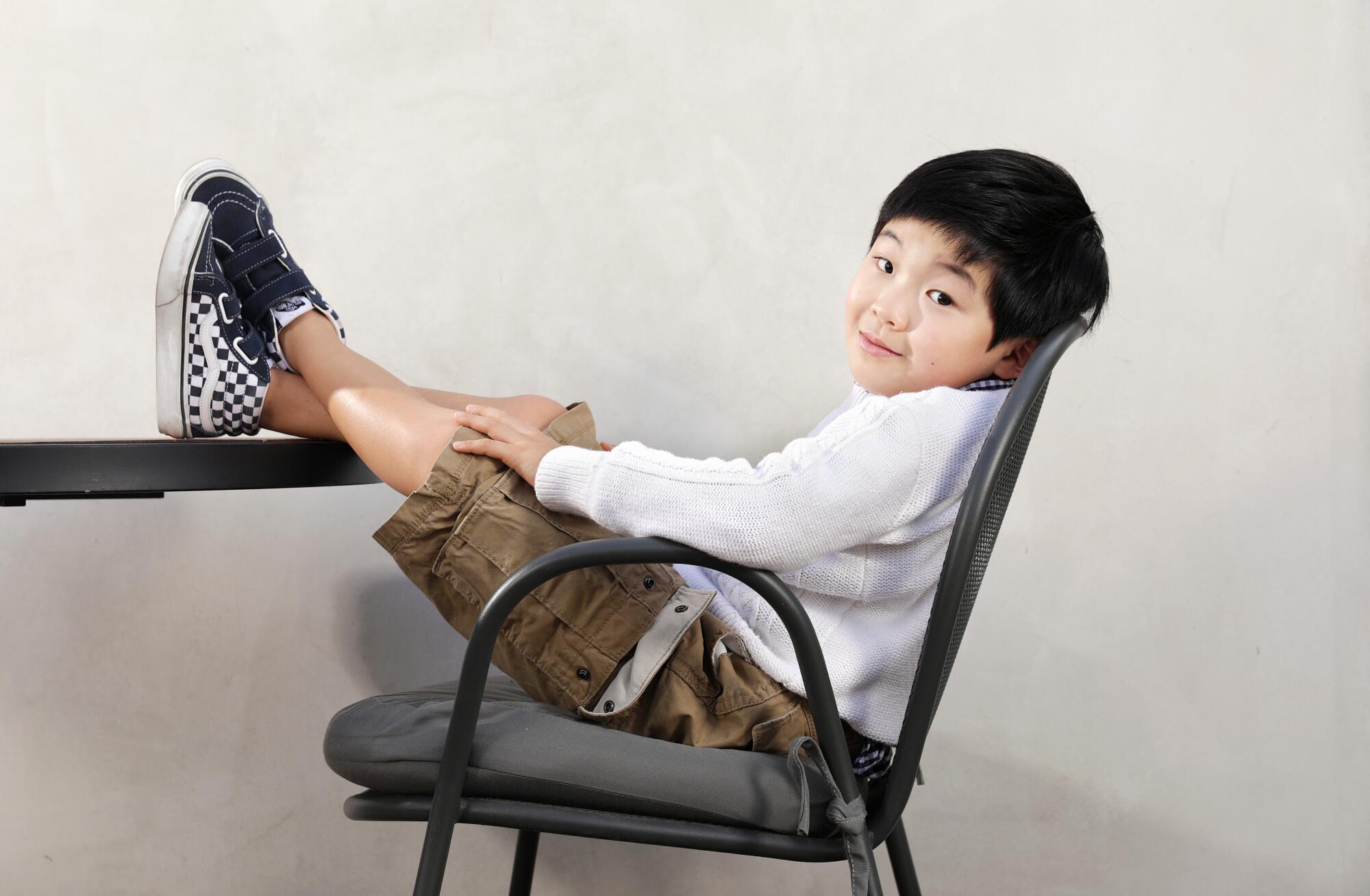
Alan’s parents also had to be the right fit — the kind of people who could “drop their life and go to Oklahoma for five weeks” but also weren’t stage parents, Kim said. Alan’s mother and father had some industry savvy — their 12-year-old, Alyssa, played young Elsa in the touring stage production of “Frozen” — but the casting director didn’t get the sense they were pushing their offspring into the entertainment business.
“They were very accommodating and wanted to learn,” Kim said. “So I just prepared them with the logistics, telling them, ‘When you get the script, you need to keep going over and over it with him. Only focus on the scene for the next day the night before — do digestible chunks so they’re not overwhelmed.’”
Alan’s mother, Vicky, was on set with her son for the entire 25-day shoot, fanning him when temperatures soared above 90 degrees and keeping his juice box collection well stocked. Kim kept in touch with her throughout production and said she knew things were going smoothly when on the second day she received a photograph of “Alan on the bed with a moisturizing mask on, getting his face all fresh for the next day of shooting, with a juice box in one hand, a teddy bear in the other.”
Vicky used hand motions to help Alan remember his lines and reminded him not to rush, “because if the words came too fast, the scene would have to be done again,” he said she told him. But because Alan’s mother was more comfortable speaking Korean, the film’s second assistant director, Steve Hannan, became another vital on-set Alan-whisperer. Hannan — who has a son around Alan’s age — noticed early on that the young actor was becoming “a little kinetic” between takes during his six-hour days.
Helena Zengel, Alan S. Kim and Ryder Allen bring the intensity — and the cute — to “News of the World,” “Minari” and “Palmer.”
“So I took it upon myself to keep him positive about the whole experience,” Hannan said. “I’m a big guy, so I would put him up on my shoulder or let him crawl on my back. But I tried to talk to him like a professional, pointing out things about set etiquette, like, ‘When the director is talking, we try to be quiet and pay attention.’”
Because much of the film takes place in wide-open farmland, golf carts often were required to get talent from their trailers to set. But Alan has such little legs that “it was hard for him to keep up just getting to the golf carts,” Hannan said, “so I’d just give him an airplane ride and make it a positive experience.”
Which isn’t to say that the then-7-year-old got special treatment. Because of his experience working in print advertisements, he knew that being on a set meant “he had to be serious,” Chung said.
“And we had to keep that atmosphere going for him to respect him as a professional,” the director continued. “After a couple of days, we set the rule that no one baby talks to him or overly celebrates when he does a great take or something. Treat him like a pro, and he’s going to act like a pro.”
For a 8-year-old, Alan does seem pretty mature. Over quarantine, he lost two teeth and immediately put the $5 he received into his savings account, which contains roughly $50.
“I always save my money,” he said with pride. “I guess for, like, big emergencies that could happen. And it’s not in a piggy bank, because robbers could just easily pop the top out and take all the money. I have a vault with a password set up, and I keep all my money in there in a zip bag with my wallet inside.”
He’s going to be adding to his savings soon. In June, he’ll start filming his second movie, a dark comedy called “Latchkey Kids” with Elsie Fisher, the teen star of 2018’s “Eighth Grade.”
“The choices he makes now are really important, and I’ve stayed in touch with his parents and offered to help them bounce anything off of me about next moves they’re unsure of,” said Kim, the casting director. “You know how the industry is. If you have a kid like Macaulay Culkin, you keep sending them in for the same thing, and it gets stale after a while. It’s about surprising the audience and letting him stretch his wings as an actor. Alan was the perfect fit for this film, but he also has the chops to have longevity.”
More to Read
Only good movies
Get the Indie Focus newsletter, Mark Olsen's weekly guide to the world of cinema.
You may occasionally receive promotional content from the Los Angeles Times.

